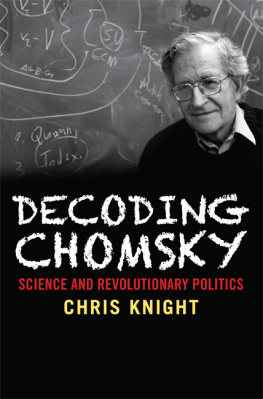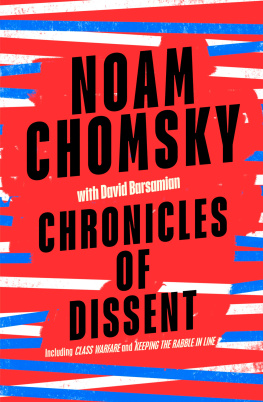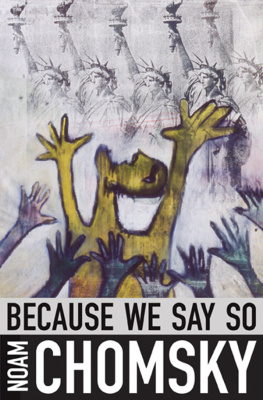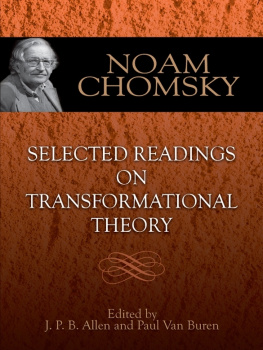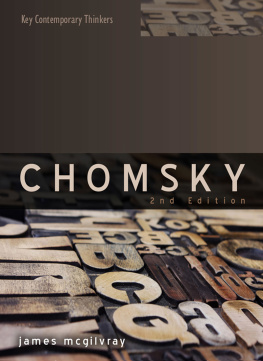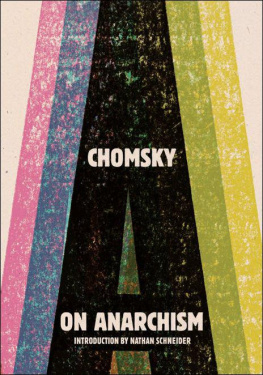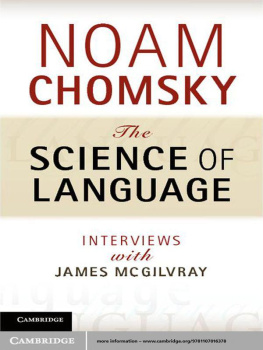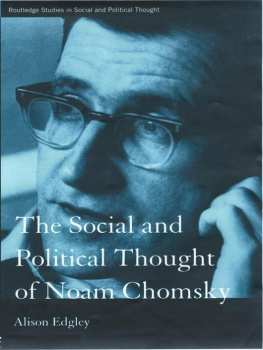DECODING CHOMSKY

Copyright 2016 Chris Knight
All rights reserved. This book may not be reproduced in whole or in part, in any form (beyond that copying permitted by Sections 107 and 108 of the U.S. Copyright Law and except by reviewers for the public press) without written permission from the publishers.
For information about this and other Yale University Press publications, please contact:
U.S. Office:
Europe Office:
Typeset in Minion Pro by IDSUK (DataConnection) Ltd
Printed in Great Britain by TJ International Ltd, Padstow, Cornwall
Library of Congress Control Number: 2016945085
ISBN 978-0-300-22146-6
A catalogue record for this book is available from the British Library.
10 9 8 7 6 5 4 3 2 1
To all my grandchildren
It is no wonder that fraternity has traditionally been inscribed on the revolutionary banner alongside liberty and equality. Without bonds of solidarity, sympathy and concern for others, a socialist society is unthinkable. We may only hope that human nature is so constituted that these elements of our essential nature may flourish and enrich our lives, once the social conditions that suppress them are overcome. Socialists are committed to the belief that we are not condemned to live in a society based on greed, envy and hate. I know of no way to prove that they are right, but there are also no grounds for the common belief that they must be wrong.
Noam Chomsky, Class Warfare, 1996
There was a time when language united people Us! One of us! rings through the darkness with every word of their shared language. Language unites them like a familiar voice.
Velimir Khlebnikov, Our fundamentals, 1919
CONTENTS
PREFACE AND ACKNOWLEDGEMENTS
W hen I first came across Chomskys scientific work, my initial reactions resembled those of an anthropologist attempting to fathom the beliefs of a previously unknown tribe. For anyone in that position, the first rule is to put aside ones own cultural prejudices and assumptions in order to avoid dismissing every strange belief as incomprehensible nonsense. The doctrines encountered may seem absurd, but there are always compelling reasons why those particular doctrines are the ones people adhere to. The task of the anthropologist is to delve into the local context, history, culture and politics of the people under study in the hope that this may shed light on the logic of those strange ideas.
The question of language and its origins is central to an understanding of what it means to be human. Although I immediately warmed to Chomskys courageous politics, his assumptions about language just baffled me. I was ready to admit my own limitations here: I had no training in theoretical linguistics. But I suspected that the gap between us was also deeply philosophical and cultural. It soon became clear that the tribe whose culture I needed to study was the Pentagon-funded war science community clustered around Chomsky in the formative period of his career. I have no interest in conspiracy theories. Not for a moment did I believe that the Pentagons initial funding of Chomskys ground-breaking work cast doubt on that works validity or implied some kind of master plan. It was also clear that nothing that Chomsky ever produced made the slightest practical contribution to American military power. Yet from the outset I suspected that Chomskys revolution in linguistics would make sense to me only if I could fathom the time and place in which it all occurred. That would mean reconstructing the intellectual climate prevailing in the United States immediately after the Second World War, when electronic computers, still in their infancy, were widely seen as the stuff of science-fiction fantasy.
When I began looking into all this, it emerged that the Pentagons scientists at this time were in an almost euphoric state, fresh from victory in the recent war, conscious of the potential of nuclear weaponry and imagining that they held ultimate power in their hands. Among the most heady of their dreams was the vision of a universal language to which they held the key.
As early as 1946, Warren Weaver had the idea of reducing all the worlds languages to basic elements which a computer could handle. By 1955, Weaver was expressing the hope that a suitably designed machine might be able to use these elements to accurately translate from any one of the worlds tongues into any other. The boldest route to the heart of things, in Weavers view, was to delve right down to the common base of human communication to discover whether a single computer code really did lie at the basis of the worlds superficially different tongues. Although Chomsky vehemently denies any connection between Weavers ambitious project and his own, the ferment around these ideas appears with hindsight to have anticipated the appeal of both deep structure and Universal Grammar.
In championing his project, Weaver reminded his audience of its Old Testament counterpart, the Tower of Babel. Humanity did originally speak with one voice, but so great was our consequent cooperative potential that God feared we might reach up to heaven, asserting ourselves as his equal. To keep us in our place, he confounded humanity by confusing our tongues, rendering us incomprehensible to one another.
Unbelievable as it may nowadays sound, American computer scientists in the late 1950s really were seized by the dream of restoring to humanity its lost common tongue. They would do this by designing and constructing a machine equipped with the underlying code of all the worlds languages, instantly and automatically translating from one to the other. The Pentagon pumped vast sums into the proposed New Tower.
The theme of mythical towers appears throughout this book. Prefiguring the Pentagons new tower was a still more ambitious plan hatched by Russias revolutionary artists and poets who seriously aimed to build a vast tower reaching to the sky. Here, too, there was support from the state. Building in glass and steel, the young Soviet government planned to construct Tatlins Tower as its Monument to the Third International. The genius behind this symbol of revolutionary internationalism and hopes for linguistic unity was the Russian poet Velimir Khlebnikov. Khlebnikovs name is not usually linked with Chomsky, but for me it was a sudden shaft of light that Khlebhnikov was the primary inspiration behind Roman Jakobson, the renowned linguist whose insights about a universal phonetic alphabet led directly to Chomskys ideas about a Universal Grammar.
The irony here is that while these Russians were anti-war anarchists and Bolshevik sympathizers, Chomsky found himself immersed in a political atmosphere of paranoid hostility to world communism amid feverish attempts to master the theory of nuclear war. Against this background, Chomsky stood out as the leading figure in the Pentagon-funded cognitive revolution in linguistics, psychology and philosophy, while at the same time making himself heard politically as one of the few voices of sanity in a world gone mad. The more I researched this period, the more I was struck by the disconnect between Chomskys politics which seemed passionate and courageous and his concept of science, which seemed the reverse on every count. It soon became clear to me that the scientist in Chomsky excluded social topics with the same scrupulous rigour that the activist in him excluded any reliance on science. This disastrous way of fragmenting human knowledge made no sense to me at all.
The following pages are the result of my efforts to take a step back and investigate what possible circumstances could have driven Chomsky to that damaging position. It was not long before I came up with a startlingly simple theory. Chomsky was working in a weapons research laboratory. As the Vietnam War intensified, his political conscience told him that criminal activities were under way. In order to speak out freely, he needed to preserve his complete autonomy with respect to anything he was doing in that lab. He could only do this by denying that his linguistic science had the slightest political or social relevance. On this level, too, his thinking quite separate from his politics was declared to be radically autonomous, being purely formal, purely abstract, purely neutral. In this way, Chomsky played a major role in strengthening the Western worlds habit of detaching social issues from the remit of science. My aim here is to explain where this split came from so as to pick up the threads where Chomsky and his colleagues broke them off restoring those essential connections between social action and science, practice and theory, body and mind.
Next page
